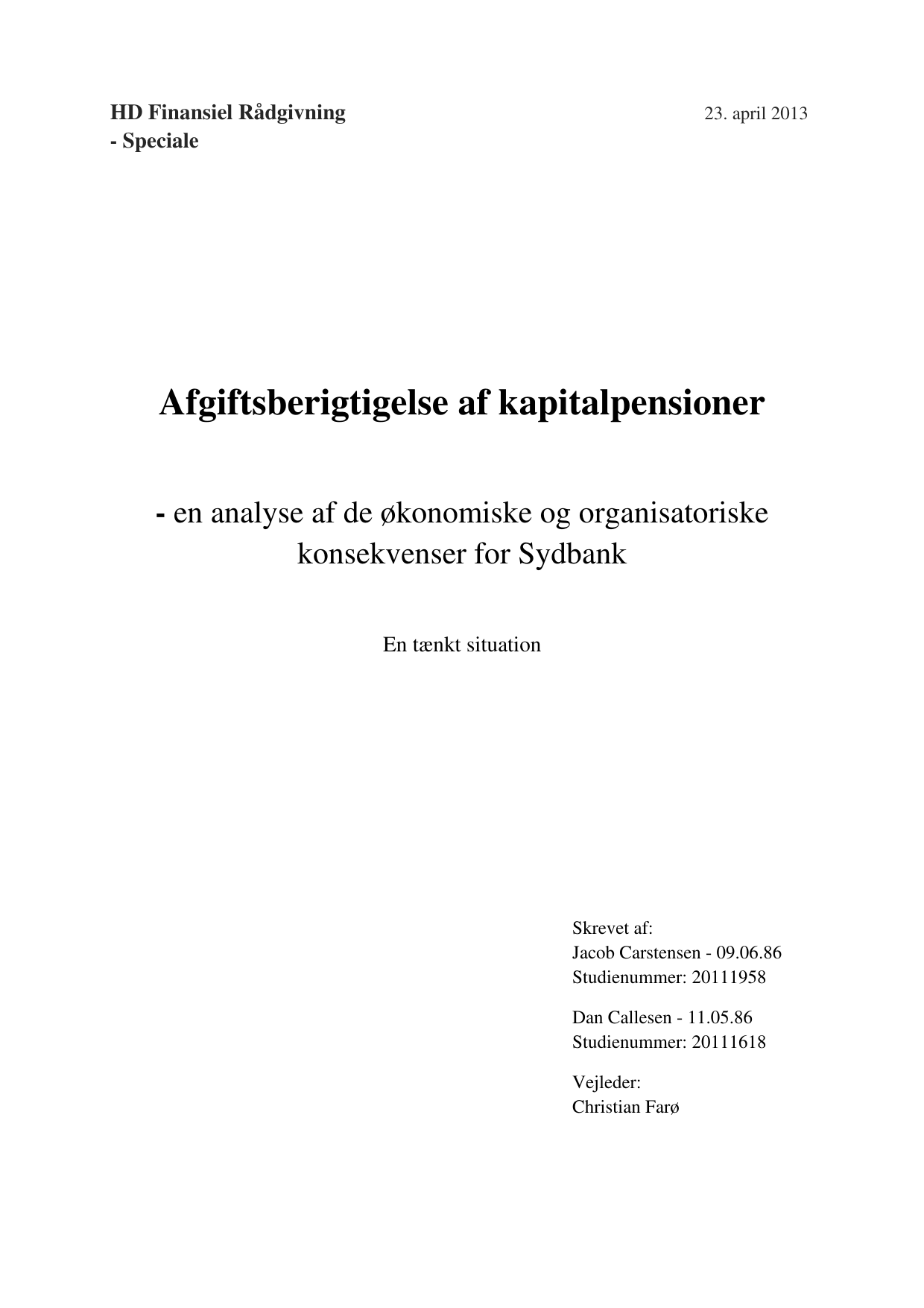
Afgiftberigtigelse af kapitalpensioner: En analyse af de økonomiske og organisatoriske konsekvenser for Sydbank
Oversat titel
Forfattere
Semester
4. semester
Uddannelse
Udgivelsesår
2013
Afleveret
2013-04-24
Antal sider
92
Abstract
In May of 2012 the Danish government proposed a number of different economic changes and reforms, which all were meant to help the Danish economy in general and also targeted specific areas of the Danish legislation, including the field of pension. On September 13th 2012 the Danish parliament passed new legislation, from the proposed ones of may 2012, regarding the field of pension. The main changes were about the Danish ”Kapitalpension”, which from 2013 no longer were to be used. So far Danish citizens could have made payments into this type of pension with tax deduction on payment, but from 2013 this could no longer be done. Instead of the ”Kapitalpension” there will now be a new form of pension called ”Aldersopsparing”. Still the citizens will get a tax-discount on the return of the investments inside this new form of pension. The bill passed by the legislators also contains an incentive for the citizens with ”Kapitalpensions” to turn their ”Kapitalpensions” into this new ”Aldersopsparing”; the incentive is that instead of paying 40 % tax when the pensions is to be withdrawn, you can convert the ”Kapitalpension” into ”Aldersopsparing” in 2013 (and 2013 only) and pay no more than 37,3 % in tax, and then pay no taxes when the new pension is to be withdrawn at your retirement. This potentially has great significance on the Danish banks revenue and liquidity, besides the Danish state finances, and this was the reason for our research in this thesis. In this thesis we tried to estimate the economic effect of this pension reform on the Danish bank ”Sydbank”, by making specific well-argued assumptions on some general data and transferring these data onto Sydbank. We were also forced to make assumptions about how many who will use this tax-incentive, hence the time of the reform and the fact that we are right in the middle of it! Our analysis in this thesis shows that this pensions reform has no greater influences on Sydbank’s economic status, even if 90 % of the citizens with ”Kapitalpensions” took advantage of the tax-incentive in 2013. The effect on the revenue (before taxes) of Sydbank is only about -5 % and the reform has no significant influence on their liquidity and/or solvency either. Hence this relatively small effect economically, it is also our conclusion that the reform is not going to have any major effects on the organization in Sydbank as a whole.
In May of 2012 the Danish government proposed a number of different economic changes and reforms, which all were meant to help the Danish economy in general and also targeted specific areas of the Danish legislation, including the field of pension. On September 13th 2012 the Danish parliament passed new legislation, from the proposed ones of may 2012, regarding the field of pension. The main changes were about the Danish ”Kapitalpension”, which from 2013 no longer were to be used. So far Danish citizens could have made payments into this type of pension with tax deduction on payment, but from 2013 this could no longer be done. Instead of the ”Kapitalpension” there will now be a new form of pension called ”Aldersopsparing”. Still the citizens will get a tax-discount on the return of the investments inside this new form of pension. The bill passed by the legislators also contains an incentive for the citizens with ”Kapitalpensions” to turn their ”Kapitalpensions” into this new ”Aldersopsparing”; the incentive is that instead of paying 40 % tax when the pensions is to be withdrawn, you can convert the ”Kapitalpension” into ”Aldersopsparing” in 2013 (and 2013 only) and pay no more than 37,3 % in tax, and then pay no taxes when the new pension is to be withdrawn at your retirement. This potentially has great significance on the Danish banks revenue and liquidity, besides the Danish state finances, and this was the reason for our research in this thesis. In this thesis we tried to estimate the economic effect of this pension reform on the Danish bank ”Sydbank”, by making specific well-argued assumptions on some general data and transferring these data onto Sydbank. We were also forced to make assumptions about how many who will use this tax-incentive, hence the time of the reform and the fact that we are right in the middle of it! Our analysis in this thesis shows that this pensions reform has no greater influences on Sydbank’s economic status, even if 90 % of the citizens with ”Kapitalpensions” took advantage of the tax-incentive in 2013. The effect on the revenue (before taxes) of Sydbank is only about -5 % and the reform has no significant influence on their liquidity and/or solvency either. Hence this relatively small effect economically, it is also our conclusion that the reform is not going to have any major effects on the organization in Sydbank as a whole.
Emneord
